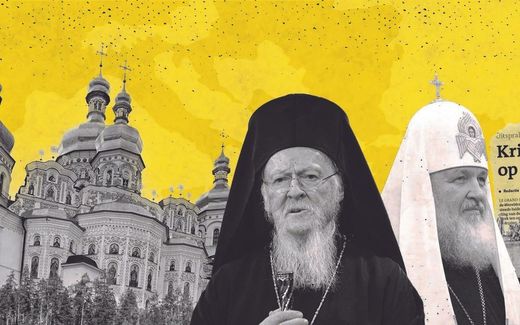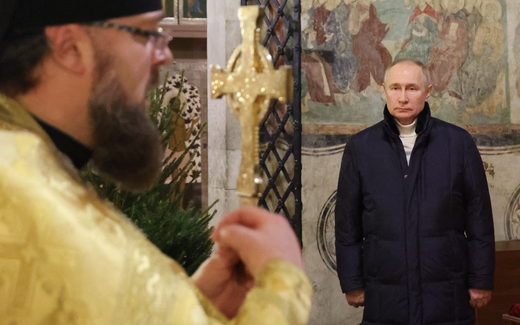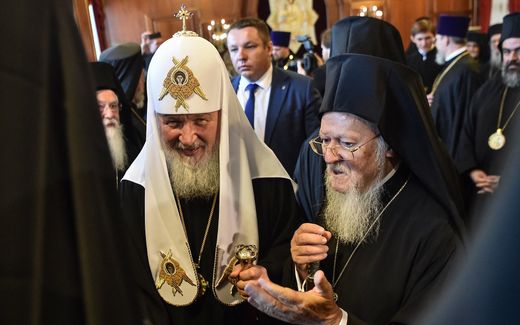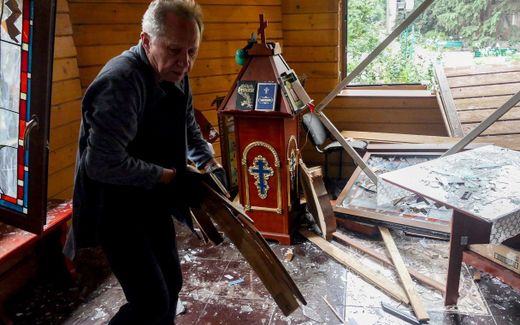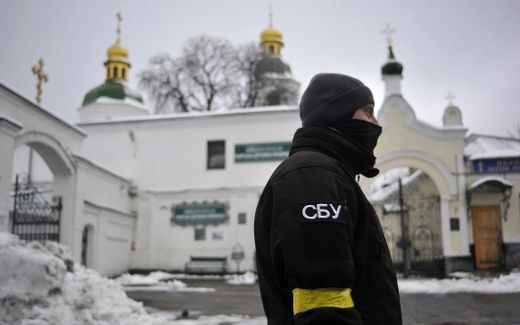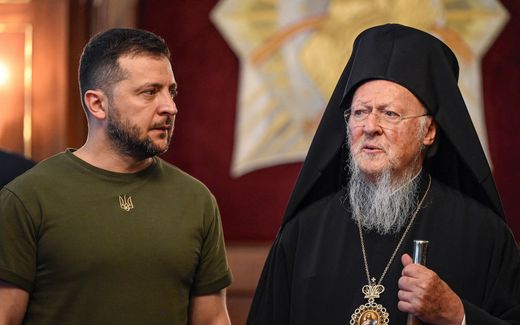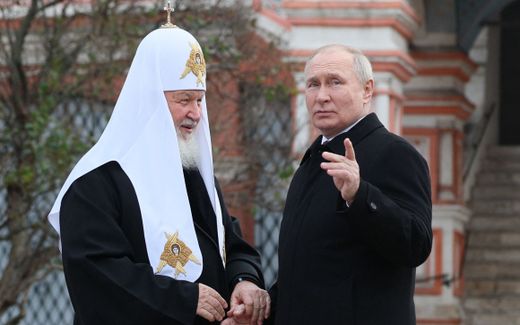Patriarch Kirill preaches Orthodox jihad: ‘Soldiers who die on the battlefield will receive eternal salvation’
07-06-2025
Eastern Europe
Arieke Smits-Lucas
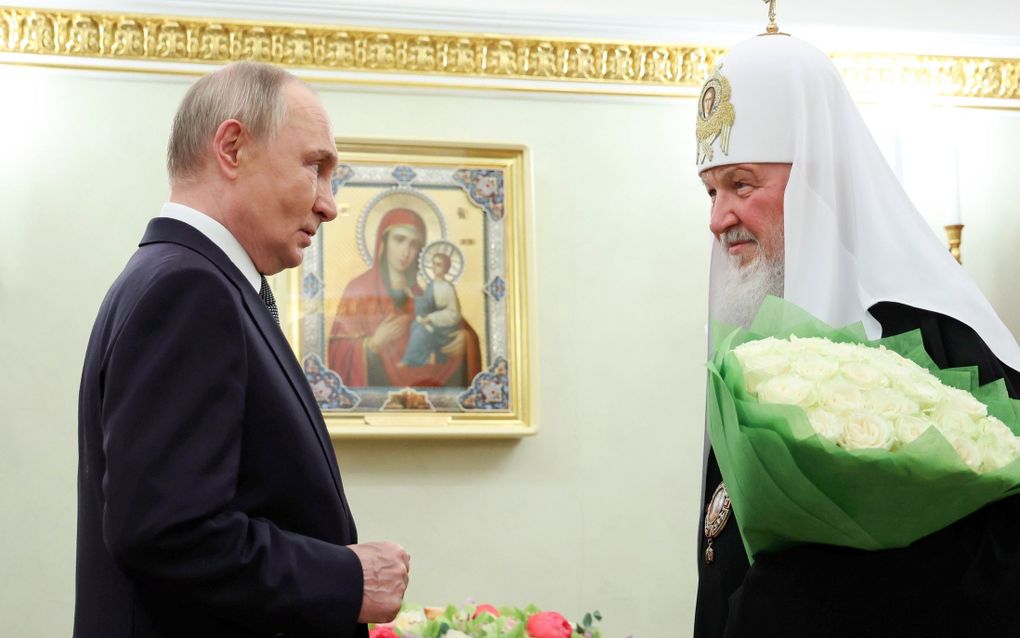
Patriarch Kirill supports the Russian President Putin in his war in Ukraine. Photo EPA, Alexander Kazakov
Eastern Europe
The Russian Orthodox Church plays a key role in justifying Putin's war in Ukraine by preaching an Orthodox version of jihad. That is the view of Russia expert Lucy Ash. “The union of church and state works like poison in society.”
In the early morning of 24 February 2022, Putin announces his “special military operation” in Ukraine. That same day, Russian Patriarch Kirill prays for peace. But when a few days later, it becomes clear that there will be no immediate victory parade in Kyiv, he changes his tone. Following Putin's lead, he says that Russians and Ukrainians are one people, pitted against each other by external dark forces.
Four months later, the Russian president reiterates his position when he opens an exhibition in Moscow to commemorate the 350th anniversary of the birth of Peter the Great (1672-1725). The former Russian tsar, who won a war against Sweden, among other things, had ‘returned’ territory to Moscow, according to Putin. “Apparently, it is also our destiny to take back and strengthen what belongs to Russia.”
These events highlight the corrupt interdependence between church and state, which has s persisted for centuries. This is the view of British author Lucy Ash in her recently published book “The Baton and the Cross”. In it, she describes the history of the Russian Orthodox Church from its origins around the year 1000 to the invasion of Ukraine.
What made you want to delve into history?
“I was looking for answers to the question of why the church behaved the way it did after the annexation of Crimea and the war in Donbas in 2014, but especially after the large-scale invasion of Ukraine. I also wanted to understand why Kirill is so slavishly loyal. You would expect a Christian to call for an end to the bloodshed. But he didn’t.”
“I think Putin genuinely believed Russia could become a prosperous European nation.”
What was remarkable?
“It appears that throughout the centuries, the Russian Church has always tended to align itself with whoever was in power. Vice versa, monarchs primarily utilised religion for practical reasons. Prince Vladimir (956-1015) ruled over the Kyivan Rus, the early medieval predecessor of present-day Russia, Ukraine and Belarus, with Kyiv as its centre. He wanted to be on good terms with Byzantium, because that Orthodox superpower was an important trading partner for Vladimir. That is why he called on his subjects to convert to the Orthodox Church.
On the other hand, religion was also used to justify wars. Tsarina Catherine the Great (1729-1796) annexed a large part of Ukraine under the banner of religion. She claimed she wanted to restore the ancient territories of the Kyiv Rus and promote Orthodox Christianity. Putin admires that.”
In March 2000, Putin stated that Russia is part of European culture. Was he serious about that?
“I think Putin genuinely believed Russia could become a prosperous European nation. I don’t know if he truly believed in democratic choices because the KGB Secret Service raised him. But I do think he liked the idea of being accepted and respected in the West.”
How do you explain his change of heart?
“Putin quickly felt betrayed. After 9/11, for example, the president allowed the United States to use air bases in Central Asia. But he felt he had never been thanked for this. Instead, NATO steadily encroached on his backyard. At the same time, a series of former Soviet republics turned their backs on the Russian economic zone in an attempt to join the European Union. Putin must have felt that he was losing power. That is why he sought support from the Orthodox Church.”
“The most important thing, however, is that religion provides Putin with an ideological framework for his war in Ukraine.”
Is Putin a believer?
“Putin was baptised as a five-month-old baby, and he diligently crosses himself on television. But I don’t know if he is sincere. His actions are so contrary to the Gospel that I find it difficult to imagine.
Like many Russians, the president also mixes orthodoxy with superstition. For example, some former journalists from the Kremlin press pool talk about the ban on stepping on Putin’s shadow. And during a Eurasian summit in 2022, the president wore a red thread around his right wrist. This was supposed to ward off evil and ill health.
The most important thing, however, is that religion provides Putin with an ideological framework for his war in Ukraine. He believes he has a moral and spiritual right to invade that country. He cannot accept that the place where Christianity began for Russians –around Kyiv– happens to be in a country that wants nothing more to do with him. Patriarch Kirill supports him in this.”
Why?
“In his early years, Kirill did not always align with the authorities. Occasionally, he openly sided with the increasingly impoverished Russians. But he soon changed his mind radically and called Putin’s presidency ’a miracle of God.’ I think the FSB secret service pressured Kirill to follow the Kremlin line.
“Putin finds a spiritual outlet for his expansionist foreign policy in the church.”
The bond between the patriarch and Putin is so strong because they depend on each other. Putin finds a spiritual outlet for his expansionist foreign policy in the church. Conversely, Kirill, like his predecessors, receives political protection and access to wealth, which makes him willing to preach an Orthodox version of jihad. He promises eternal salvation to Russian soldiers who die in the fight to restore the Kyivan Rus.”
Are there also clergymen who are rebelling?
“Many of them hate the war. But most of the 40,000 priests in Russia have been silenced. Ioann Koval, a Moscow priest who replaced the word “victory” with “peace” in a compulsory prayer, has been removed from office. Others have been imprisoned or fled abroad.”
“In Russia itself, I see that more and more young people are turning their backs on the church because of its loyalty to the state.”
How do you see the future of the Russian Orthodox Church?
“Not very promising. In Ukraine, you have the Ukrainian Orthodox Church, which has been under the Moscow Patriarchate for centuries. But because of the war, thousands of Ukrainian parishes refuse to remain affiliated with a church that dances to the Kremlin’s tune. Kirill has already lost at least a fifth of his 150 million parishioners.
In Russia itself, I see that more and more young people are turning their backs on the church because of its loyalty to the state. Jesus calls us to love our neighbours as ourselves. Young Russians, in particular, are asking how that can be reconciled with killing people on the battlefield. That is why I think the church will increasingly lose its authority. What that will mean for Putin, only time will tell.”
This article was translated by CNE.news and published by the Dutch daily Reformatorisch Dagblad on May 27, 2025
Related Articles

